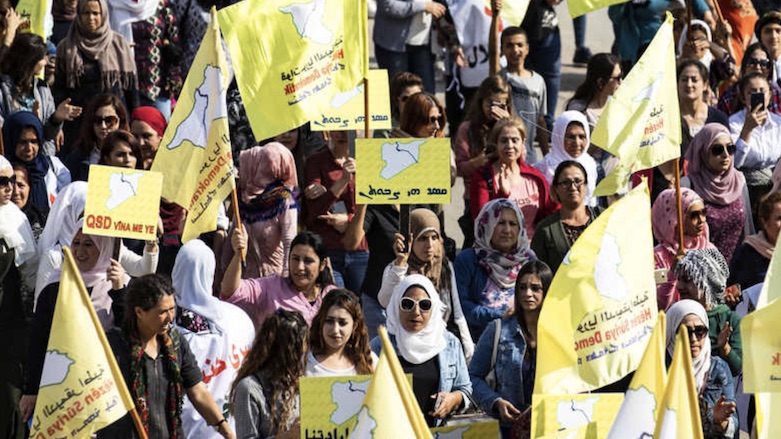Syrian delegation explores dialogue between Kurds and Damascus, following US withdrawal

ERBIL (Kurdistan 24) – A delegation of Syria's internal opposition parties, with approval from Damascus, visited the northeastern Syrian city of Qamislo (Qamishli) and met with Kurdish parties to discuss the future of the area.
The meeting occurred over the weekend and marked the second time the two sides have held such talks.
Syrian MP Newaf Terad Almilhim explained to Syria’s al-Watan newspaper that the delegation from Damascus did not discuss the differences between the Autonomous Administration and the Damascus-proposed Local Administration. Rather, “we only proposed our project.”
The Damascus delegation offered its ideas as a political effort, with the aim of building a team for negotiations with the Syrian government.
Perwin Ibrahim, head of the pro-Syrian government National Youth Party for Justice and Development, told Kurdistan 24 that although “some people” see the administration of northeast Syria as a separatist project, “we, the national parties, do not consider it as a separatist project.”
“We are here to make sure the sacrifices made by people here [in northeast Syria] will lead to the realization of the legitimate rights of the Kurds.”
According to an International Crisis Group report, issued last summer, the Syrian regime has shown a willingness to discuss limited concessions on administrative decentralization, but it has not compromised on its intention to assert full authority over local security services.
The Kurdish-led administration in northeastern Syria earlier held talks with Damascus, but they failed. The Kurds called for some degree of autonomy. However, the Syrian government insisted on a return of all territory to its full control.
“We don't accept local-administration in accord with article 107 of the Syrian constitution,” which provides for a very limited devolution of such authority, Mustafa Mashaykh, a member of the Syrian Democratic Council (SDC) leadership committee, told Kurdistan 24.
“And the Syrian people in general don't accept it,” he added. “We, as Kurds, have our uniqueness and our patriotic rights regardless of our Syrian national rights.”
The Syrian government still wants to solve “everything via military means and this will never be successful,” Mashaykh said. But we are still ready to negotiate with Damascus about Kurdish issues and Syria’s future, until it is possible to reach a solution that will benefit the Syrian people, he added.
Local authorities, however, are in a weaker position following the Oct. 9 withdrawal of US forces from the border area with Turkey. They have been obliged to reach a deal with Damascus to deploy Syrian forces to protect the border against the Turkish attacks that began immediately after the departure of US troops.
Moreover, the Syria regime is attempting to undermine the Kurdish-led Syrian Democratic Forces (SDF), which have been America’s main partner in the fight against the so-called Islamic State in Syria.
On Dec. 5, Syria's national security chief Ali Mamlouk met with Arab tribal leaders in Qamishlo, calling on their ‘children’ to leave the SDF.
Democratic Union Party (PYD) spokesperson Salih Muslim told Kurdistan 24, “The [Syrian] regime needs to realize that the first step is to view us as Syrians. We have protected Syria as much as they have.”
“They should not see themselves as above us. The question is how to come to an agreement,” he said. “Some say we have become US agents. That is not true; we have not given our will to the US. We ourselves determine our will.”
“Today we have united Arabs, Kurds and other components,” of society. “So it is not only a Kurdish issue in a corner of Syria. We want a democratic and decentralized Syria,” Muslim concluded.
Editing by Laurie Mylroie
